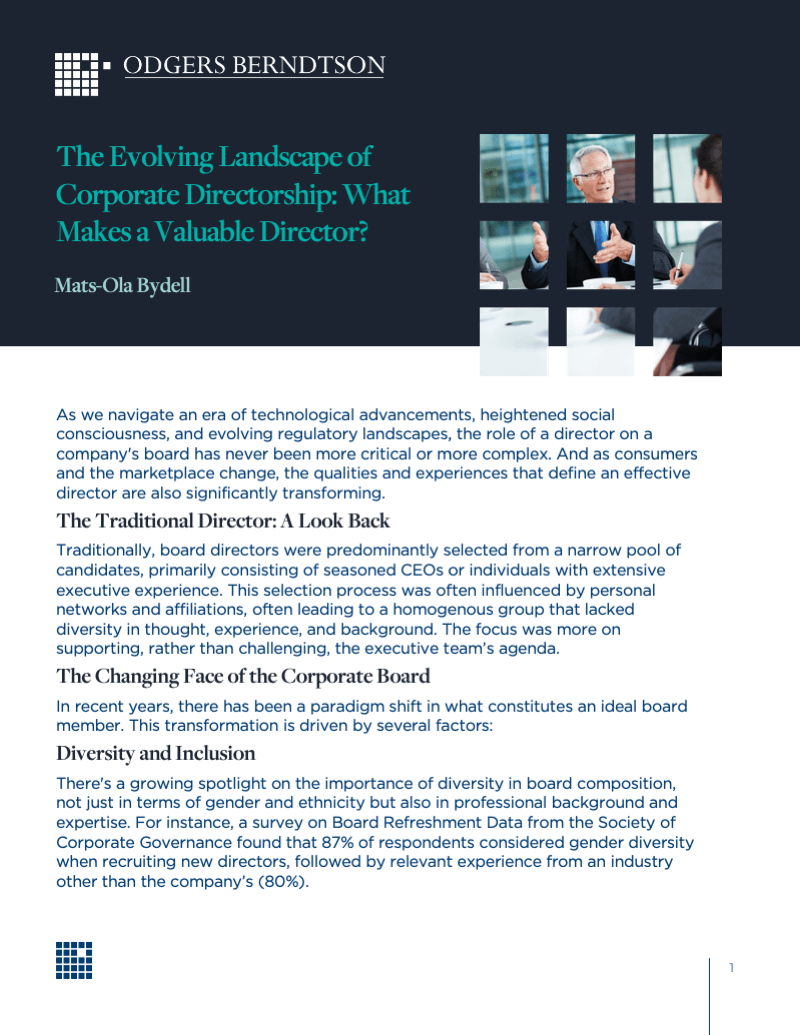As we navigate an era of technological advancements, heightened social consciousness, and evolving regulatory landscapes, the role of a director on a company's board has never been more critical or more complex. And as consumers and the marketplace change, the qualities and experiences that define an effective director are also significantly transforming.
The Traditional Director: A Look Back
Traditionally, board directors were predominantly selected from a narrow pool of candidates, primarily consisting of seasoned CEOs or individuals with extensive executive experience. This selection process was often influenced by personal networks and affiliations, often leading to a homogenous group that lacked diversity in thought, experience, and background. The focus was more on supporting, rather than challenging, the executive team’s agenda.
The Changing Face of the Corporate Board
In recent years, there has been a paradigm shift in what constitutes an ideal board member. This transformation is driven by several factors:
Diversity and Inclusion
There's a growing spotlight on the importance of diversity in board composition, not just in terms of gender and ethnicity but also in professional background and expertise. For instance, a survey on Board Refreshment Data from the Society of Corporate Governance found that 87% of respondents considered gender diversity when recruiting new directors, followed by relevant experience from an industry other than the company’s (80%).
Many regulations now mandate this, however, it’s been shown that board diversity has a positive impact on business performance. Research from MicKinsey found “a 39 percent increased likelihood of outperformance for those in the top quartile of ethnic representation versus the bottom quartile”. A diverse board is more likely to challenge groupthink and bring a variety of perspectives to the table, leading to better and more thoughtful decision-making.
ESG and Technological Expertise
As environmental, social, and governance (ESG) issues become central to business strategy, boards increasingly seek directors with expertise in these areas.
As per the Society of Corporate Governance, 76% of respondents in Europe mention ESG skills and experience as important when recruiting new directors, reflecting a shift towards sustainability and ethical governance.
Similarly, with the digital transformation of businesses, directors with a strong understanding of technology and its impact on the business model are in high demand. With 54% of respondents in the Board Refreshment Survey stating that cybersecurity skills and experience are important in building their board pipeline, it's clear that boards are preparing for future needs. This is particularly true when it comes to business changes driven by advanced and emerging technologies like blockchain and AI, which are greatly impacting even industries that are traditionally very conservative.
Stakeholder Expectations
Investors and stakeholders are demanding more transparency and accountability from boards. This calls for directors who are not only adept at navigating financial complexities but are also sensitive to social and environmental impacts. Increasingly, as boards must not only meet consumer and regulatory demands, but be more forthright about how they are doing so, boards seek out directors that not only understand these complexities but also have significant communications skills and experience.
Regulatory Environment
With new regulations and governance standards emerging, boards require members who are well-versed in compliance and risk management.
Key Qualities of a Modern Director
Given these changing dynamics, the skill set and mindset required for effective directorship have evolved. Modern boards look for directors that possess the following:
Strategic Acumen
Directors must possess the ability to contribute to strategic discussions, offering insights that align with the company’s long-term objectives while being adaptable to changing market conditions.
Collaborative Yet Independent Thinking
This is a big shift from the way boards have been composed and directors have been chosen in the past. While teamwork is essential, a good director must also maintain independence, providing unbiased perspectives and, when necessary, challenging the status quo.
Lifelong Learner
A board director role is no longer one that leaders coast into for something to do in the twilight of their career. The best directors are those who continuously update their knowledge and skills, staying abreast of industry trends, regulatory changes, and global economic shifts.
Communication Skills
As mentioned before, effective directors articulate their thoughts clearly and constructively engage in dialogue with various stakeholders, including shareholders, employees, and the community.
The Road Ahead: Continuous Evolution
The journey towards becoming an effective director is continuous and dynamic. Directors must be willing to evolve, adapting their skills and knowledge to the ever-changing business landscape. They must be forward-thinking, anticipating future trends and preparing the company to face new challenges.
The Role of Board Recruitment and Succession Planning
To build a board that embodies these qualities, companies must adopt a more structured and strategic approach to board recruitment and succession planning. This involves moving beyond traditional networks and considering candidates from a wider array of backgrounds. Furthermore, succession planning should be an ongoing process, not just a reaction to imminent board vacancies.
The role of a corporate director is more demanding and crucial than ever. It requires a blend of traditional business acumen and a deep understanding of contemporary challenges. As the corporate world continues to evolve, so too must the composition and mindset of the boards that steer these organizations. By embracing diversity, seeking out new skills and experiences, and committing to continuous learning and ethical leadership, directors can effectively guide their companies through today’s increasing complexities and toward a successful and fruitful future.
Are you looking to diversify your board, attract directors with crucial skill sets, or increase overall board performance? Odgers Berndtson advises some of the world’s largest corporations in this area, and we hope you’ll reach out.




